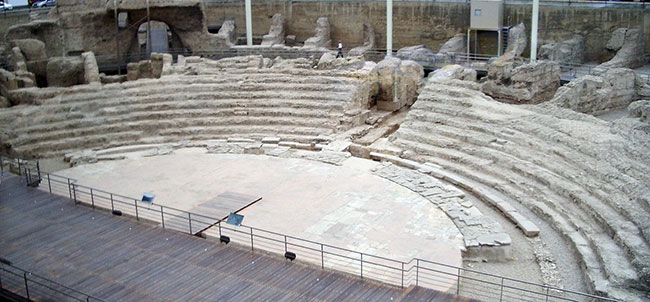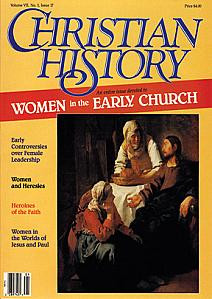PRUDENTIUS AND THE MEMORY OF SARAGOSSA’S MARTYRS

[Roman Theater at Cesaraugusta (i.e. Saragossa, or Zaragoza)—Escarlati / public domain Wikipedia File:Teatro Romano Cesaraugusta-vista desde arriba-3.jpg]
CHRISTIANS OF SARAGOSSA, Spain, underwent a terrible persecution early in the 4th century. On or around this day, 16 April 304, troops of the Roman Emperor, Dacian, killed seventeen men and a woman. The only detail we have is a list of their names from a Latin poem by Prudentius: Optatus, Lupercus, Successus, Martial, Urban, Julia, Quinitilian, Publius, Fronto, Caecilian, Felix, Eventius, Primitivus, Apodemius and four others each named Saturninus.
Prudentius exulted that Saragossa will one day offer more martyrs to Christ on his Second Coming than some cities larger or more famous. His poem also mentioned a woman named Encratis, who later underwent such savage tortures that her liver was pulled part way out of her chest. She seems to have survived the ordeal—living perhaps even into Prudentius’s day. Other Christians were ordered to leave the city but were slaughtered as they left the gates. Although he wrote down what little he knew, Prudentius complained that texts detailing these martyrdoms had been wantonly destroyed by an adversarial soldier who knew the value Christians placed on them.
Aurelius Prudentius Clemens seems to have been a native of nearby Calahorra or at least attended the cathedral there (he mentions sitting under its bishop). Well-educated, he was familiar with Christian doctrine and classical literature. He governed cities and served Christian emperors. Beyond these few details not a great deal is known about him, although in autobiographical verses he remarks that he was harshly beaten in school and was licentious as a young man:
The tears of childhood flowed
Beneath the ferule's stroke:
Soon boyhood’s season sowed
A bitter crop of lies, and Virtue’s laws I broke.
He did not abandon secular pursuits until he was in his late fifties. Becoming ashamed of his worldly past, he determined to write sacred poetry:
Thus while I write or preach
May my soul pass away,
Soaring with latest speech,
Freed from the fleshly trammels of decay!
Had he not turned to writing Christian poems, it is unlikely he would be remembered at all. As it is, he became the most notable poet of the late pagan/early Christian era; and he helped bring into being the new genres of Christian odes and allegories. He even wrote poetic apologetics. His works were popular in the Middle Ages, especially in Germany. All of his surviving poems seem to have been composed in a span of about ten years shortly before his death.
In his apologetics Prudentius defended the Nicene Creed and its doctrine of the Trinity. He was vehemently opposed to the gladiatorial contests and to the Vestal virgins who signaled when the death blows were to be struck.
—Dan Graves
----- ----- -----
For more of Prudentius's poetry, read "From the Archives: Agnes: the Virgin Martyr" in Christian History #17, Women in the Early Church






